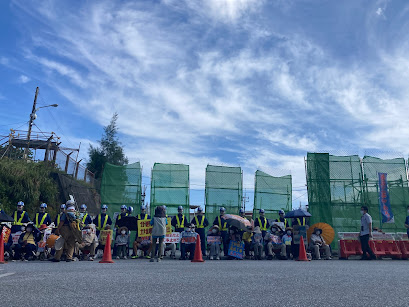World Heritage Watch Report 2024: Yambaru Forest and U.S. Military's Northern Training Area
Press Release
World Heritage Watch Report 2024 is now out!
Northern Part of Okinawa Island and U.S. Military’s Northern Training Area
On June 2, 2024, World Heritage Watch, a Berlin-based NGO dedicated to protecting and conserving UNESCO World Heritage sites, released its World Heritage Watch Report 2024 (WHW Report 2024). Our report "Northern Okinawa: A Review of Japanese and U.S. Measures of Conservation is Urgent" (p.207-p.211) is included in it with 54 other reports. The authors are Hideki Yoshikawa, Director of the Okinawa Environmental Justice Project; Masami Kawamura, Director of The Informed Public Project; Akino Miyagi, an entomologist; and Shin-ichi Hanawa of the Protect Henoko and Takae NGO Network.* This is the third time the authors participated in the WHW Report. The WHW Report 2024 has been sent to the UNESCO World Heritage Centre, IUCN, ICOMOS, and ICCROM.
Our report addresses the issue that the Japanese Ministry of the Environment has refused to report to the UNESCO World Heritage Centre and IUCN the presence of hazardous military waste in the World Heritage Yambaru forest and the Okinawa Defense Bureau’s efforts to clean up and restore the environment. It also underscores the concern that the Japanese and U.S. governments have continued to fail to study the impacts of military training on the World Heritage site, and the military training has become more complicated and troubling as militaries from other countries, including the Japanese Self-Defense Forces, now join the U.S. military’s training in the NTA. It further discusses the concern that the “cooperation” documents and mechanisms set up by both governments, including the new one released in July 2023, have failed to resolve the issues of military waste and training because made under the U.S.-Japan Status of Forces of Agreements, they are subject to the substantial discretionary power given to the U.S. military in the implementation of these documents and mechanisms. Finally, it makes three recommendations to resolve these issues, including the one that urges the Japanese and U.S. governments to enter a new agreement under the UNESCO World Heritage Convention to ensure the Outstanding Universal Value of the World Heritage Yambaru forest.
As mentioned in the preface of the WHW Report 2024, many heritage sites and World Heritage sites around the world now face destruction by war and militarization, and the UNESCO World Heritage system is being tested as it can protect and preserve them. With urgency, international institutions such as the UNEP address the impacts of war and militarization on human lives, cultural properties, and the environment. Global efforts to stop wars and militarization are needed more than ever, and protecting the Yambaru forest from military training and military waste is our contribution to this global endeavor.
With the release of the WHW Report 2024, the authors are more determined than ever to work with civil society members, the World Heritage Centre, IUCN, and the Japanese and U.S. governments to transform the Yambaru forest into a 'true World Natural Heritage' site, free of military training and waste.
Contact:
Hideki Yoshikawa
Director, Okinawa Environmental Justice Project
*Editorial error: only two of the four authors’ names appear on the first page of our report.
WHW Report 2024



